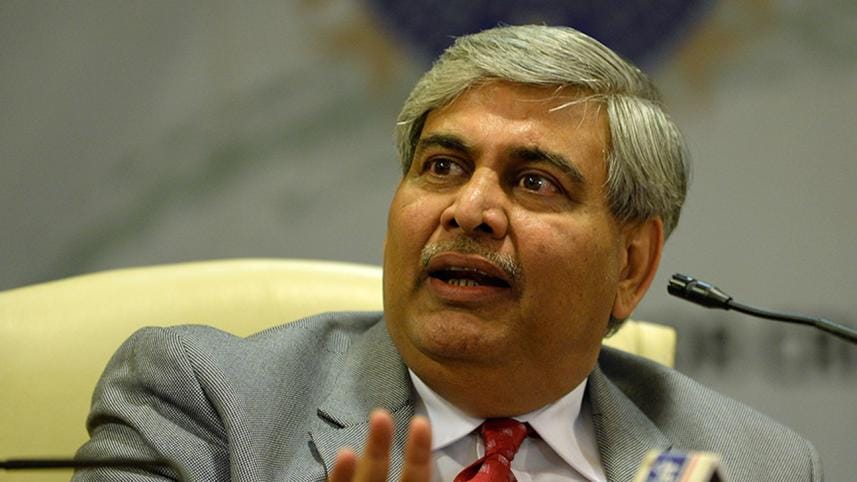ICC announces review of 2014 restructuring

The ICC has announced it will carry out a complete constitutional review of the changes brought about by the "Big Three" takeover in 2014. Moves have already begun to dismantle the system of governance proposed by the BCCI, ECB and CA two years ago, with confirmation of the expected change to make the ICC chairman an independent position.
The outcomes from the ICC board meeting on Wednesday also included removing permanent positions for India, England and Australia on the Executive Committee and the Financial & Commercial Affairs Committee - the ICC's two most powerful forums.
In a statement, the ICC said the board had "agreed to carry out a complete review of the 2014 resolutions and constitutional changes with a view to establishing governance, finance, corporate and cricketing structures that are appropriate and effective for the strategic role and function of the ICC and all of its members".
C, the BCCI president who is also currently serving as ICC chairman, signalled his intention to roll back the changes overseen by his predecessor N Srinivasan in an interview last year, when he referred to "the three major countries bullying the ICC". Manohar will now head the five-man steering group set up to conduct the review, with an aim of putting forward recommendations at the ICC's annual conference in June.
Alongside Manohar on the steering group will be ECB president Giles Clarke, in his role as chairman of the F&CA Committee. Clarke was one of the architects of the ICC revamp - which resulted in a greater share of revenue for the three main boards - and had been expected to run for the position of chairman. The rest of the group will comprise heads of the ICC's Governance Review Committee, Executive Committee and Associate/Affiliate Member group: Nazmul Hassan, David Peever and Andrew Armitage respectively.
he introduction of an independent chairman was intended to "avoid any potential conflicts of interest and to follow best practice principles of good governance". The ICC's next chairman, to be elected later this year, will no longer be able to hold a position on their home board, as Srinivasan and subsequently Manohar did.
Candidates to succeed Manohar must have served as an ICC director. The chairman will be able to serve for a maximum of three two-year terms.
Manohar said the board had agreed on a need for greater transparency and would reinstate the practice of Full Member boards presenting their audited accounts to the ICC on an annual basis. Three of the board's four annual meetings will now take place outside of the UAE, where the ICC is headquartered, with the Annual Conference set to be held in Edinburgh from June 27 to July 2.
"We had very purposeful and positive meetings, and the decisions taken clearly reflect that we collectively want to improve the governance in a transparent manner, not only of the ICC but also the Member Boards," Manohar said. "This, in turn, will enhance the image and quality of the sport. No Member of the ICC is bigger than the other and I am determined to make a meaningful contribution in this regard with support of all the Members."
Other areas addressed during the board meeting in Dubai included an update on the cricket's potential viability as an Olympic sport, which concluded that further work was required; and the establishment of an Anti-Corruption Oversight Group, which includes former India batsman Rahul Dravid, to annually review strategies to fight corruption.
The ICC has also reinstated Sri Lanka Cricket's full membership. SLC had been stripped of its voting rights at the ICC table in April last year, when the ICC took a dim view of a politically appointed board in Sri Lanka. That board was dissolved and elections held early in January. The ICC also said "SLC is now entitled to full funding", after having kept payments due to SLC in escrow last year.
The USA Cricket Association remains suspended, although the ICC has approved development and high-performance projects for 2016, to be funded from a "special projects" budget.
A change has been made to the qualification process for the 2018 Under-19 World Cup, with the highest-placed Associate team from the ongoing tournament in Bangladesh being given an automatic spot, alongside the ten-Test playing nations. The remaining five sides will qualify through the regional qualifying tournaments.
ICC to examine cricket calendar
Alongside its governance review, the ICC will begin trying to unpick the game's tangled schedule in order to build a "clearer cricket calendar with greater context".
The board is due to examine the balance of international cricket versus domestic T20 leagues - the latest of which, the PSL, starts this week - and the positioning of the three formats: Test, ODI and T20.
Among the changes wrought by the ICC in 2014 was the abolition of the Future Tours Programme. Since then, tours have been arranged through bilateral agreements, without the involvement of the ICC.
Players and broadcasters are likely to be among those consulted over coming months, with presentations on "various cricketing models" due to be made to the board.



 For all latest news, follow The Daily Star's Google News channel.
For all latest news, follow The Daily Star's Google News channel.
Comments